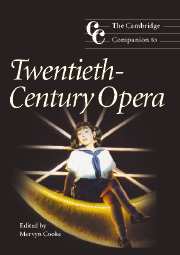Book contents
- Frontmatter
- Part one Legacies
- Part two Trends
- Part three Topographies
- 8 France and the Mediterranean
- 9 Austria and Germany, 1918–1960
- 10 Eastern Europe
- 11 Russian opera: between modernism and romanticism
- 12 American opera: innovation and tradition
- 13 Opera in England: taking the plunge
- Part four Directions
- General index
- Index of operas
10 - Eastern Europe
from Part three - Topographies
Published online by Cambridge University Press: 28 September 2011
- Frontmatter
- Part one Legacies
- Part two Trends
- Part three Topographies
- 8 France and the Mediterranean
- 9 Austria and Germany, 1918–1960
- 10 Eastern Europe
- 11 Russian opera: between modernism and romanticism
- 12 American opera: innovation and tradition
- 13 Opera in England: taking the plunge
- Part four Directions
- General index
- Index of operas
Summary
Once upon an ancient time …
A story introduced in rhyme …
The tale is old, the moral new,
Even the players could be you
Yourselves, Ladies and Gentlemen.
You’re watching me, I’m watching you,
But which is which and who is who?
Consider, safely in your beds
Is the theatre here, or in your heads
Ladies and Gentlemen?
Here there is a generous ration:
Crimes of violence and passion –
In wars outside the blood runs redly:
Here is something far more deadly,
Ladies and Gentlemen.
The prologue to Duke Bluebeard's Castle (John 1991, 46) invites the audience to use the opera as a mirror for itself, to observe connections between spectator and spectated and also to look beyond the surface of the bloodied castle for its meanings. We do well to think similarly when considering ‘Eastern Europe’, which unlike other ‘Topographies’ in this volume, was not a politically unified entity before the Soviet Union occupied it in 1949. The region' s agglomeration of nations has nonetheless been characterized as a whole in various ways, regarded frequently as an aspiration, but equally often as a problem(see, for example, the editors' preface to Central Europe, 1/1 (May 2003), 3). It has been viewed as a ‘Kingdom of the Spirit’ (Garton Ash 1989, 161–91), a region of people sharing ‘thought-styles and thoughtworlds’ (Schöpflin 2004) or just a myth constructed by Western Europe (Wolff 1994). Eastern Europe's citizens themselves have had far from straightforward relations with their so-called homeland – many emigrated beyond its apparent provinciality or lived in deeply nostalgic, enforced exile. And at times, people have been placed there by sheer brute force.
- Type
- Chapter
- Information
- The Cambridge Companion to Twentieth-Century Opera , pp. 165 - 180Publisher: Cambridge University PressPrint publication year: 2005



